ICNA at the 10th National Muslim Advocacy Day on Capitol Hill
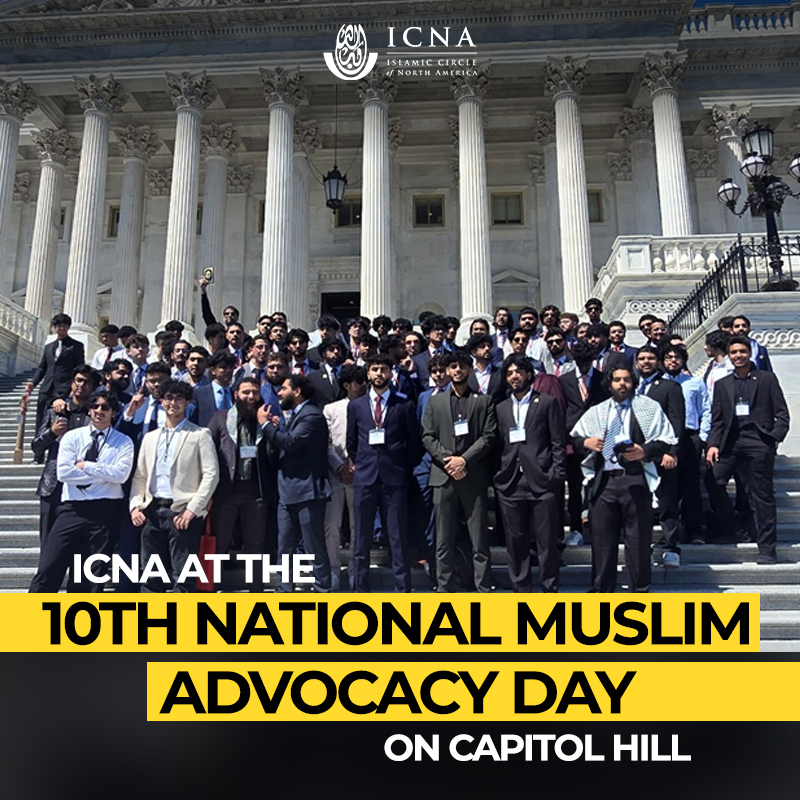
Alhamdulillah, ICNA marked a historic presence at the 10th Annual National Muslim Advocacy Day on Capitol Hill, hosted by the U.S. Council of Muslim Organizations (USCMO). This milestone event brought together Muslim leaders, activists, and constituents from across the nation to engage directly with members of Congress on pressing domestic and international issues. Under the theme “Defending Rights, Shaping Policy,” the 2025 National Muslim Advocacy Days centered on urgent and timely issues—including the protection of free speech, safeguarding students and campuses from threats and intimidation, defending civil rights and religious freedoms, and responding to grave humanitarian crises in Gaza and Sudan, as well as the ongoing persecution of Uyghur Muslims in China. The event powerfully underscored the critical need for the American Muslim community to hold elected officials accountable and to remain actively engaged in shaping national policy. ICNA’s delegation was the largest in the country, with nearly 325 registrants from 19 states, including nearly 200 dynamic youth and young adults from Young Muslims (YM). ICNA Sisters were also prominently represented, led by Sr. Sumaira, showcasing ICNA’s commitment to fostering inclusive civic participation. At the Capitol Hill evening reception, ICNA was honored as the top participating organization with the highest number of attendees. ICNA President Br. Saad Kazmi graciously invited Br. Ammar Siddiqui from Young Muslims to accept the award on behalf of the movement. The recognition highlighted ICNA’s strong grassroots infrastructure and the youth organizations growing role in national advocacy. Prominent guests included Congresswomen Rashida Tlaib, Ilhan Omar, and Latifa Simmons, along with leaders from major national Muslim organizations. Their attendance served as a reminder of the increasing visibility and impact of American Muslims in the civic and political spheres. Logistics for ICNA’s participation—including webinar-based training, hotel accommodations, transportation, meals, meeting schedules, and event coordination—were expertly managed by the ICNA Council for Social Justice (CSJ) team. A special hotel-based evening session, also hosted by CSJ, brought together six ICNA Ameers: Dr. Talat Sultan, Br. Zahid Hussain, Br. Naeem Baig, Br. Javaid Siddiqi, Br. Mohsin Ansari, and Br. Saad Kazmi, alongside ICNA Sisters President Sr. Sumaira. This Advocacy Day continues a tradition that began in 2015 when USCMO first launched this initiative to connect Muslim communities with lawmakers and advance a legislative agenda rooted in equality, social justice, and religious freedom. It has since become a powerful platform for fostering lasting relationships between American Muslims and policymakers, promoting a more inclusive and just society for all. In follow-up, CSJ will conduct a survey of attendees to gather feedback, identify areas of improvement, and encourage continued local engagement in advocacy efforts across the country, In Shaa Allah. ICNA President Br. Saad Kazmi encouraged attendees to carry the energy and training from the Advocacy Days back to their cities and towns, urging them to continue the vital work of social justice and advocacy at the local level. With meticulous planning and broad community support, this year’s event was executed seamlessly. May Allah swt accept the efforts of all involved and allow us to build upon this momentum in the service of our Deen and country.Ameen.
Passing of Pope Francis
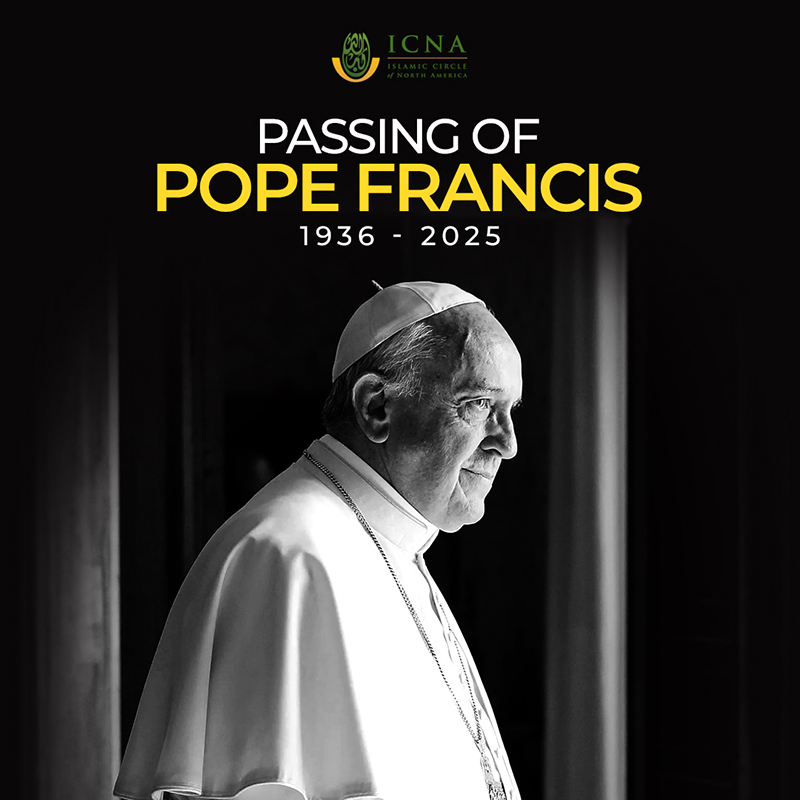
All Praises are for Allah Lord of all that exists, and peace and blessings of Allah be on His final Messenger and his household. ICNA is deeply touched by the passing of Pope Francis, who departed this world following a brief illness. We extend our heartfelt condolences to our Catholic partners in interfaith dialogue (National Catholic-Muslim Dialogue), the global Catholic community, and all those around the world who are mourning his loss. Pope Francis was a symbol of humility, compassion, and bridge-building, and his absence will be deeply felt across faith traditions and communities committed to peace and justice. This was so evident from his simple life-style. His life exemplified humility and compassion, marked by an unwavering commitment to the service of humanity. Pope Francis dedicated himself to uplifting the marginalized, advocating for peace, and promoting justice across all borders. His deep yearning for a more peaceful world was powerfully reflected in his final public message, delivered just a day before his passing, in which he called for an immediate ceasefire in Gaza. In his emotional appeal, he described the situation there as both “dramatic and deplorable,” underscoring his enduring concern for human suffering and his moral leadership until the very end. Pope Francis stood as a moral beacon in a world so divided, yet he consistently advocated for peace, justice, and compassion for the marginalized—even in the face of criticism and adversity. His steadfast dedication to building bridges between faiths and promoting dialogue rooted in mutual respect left a lasting impact that transcended religious boundaries. Through his words and actions, he inspired hope and understanding, not only within the Christian world but across the global interfaith community. As Muslims, we recognize the value of righteous leadership and the importance of standing together in times of both joy and sorrow. Pope Francis’s legacy of empathy, simplicity, and advocacy for the downtrodden resonates deeply with our own Islamic values. We pray that God, the Most Merciful, brings comfort to those mourning his loss and may his efforts toward unity and compassion continue to inspire generations to come.
In Tribute to Professor Khurshid Ahmad
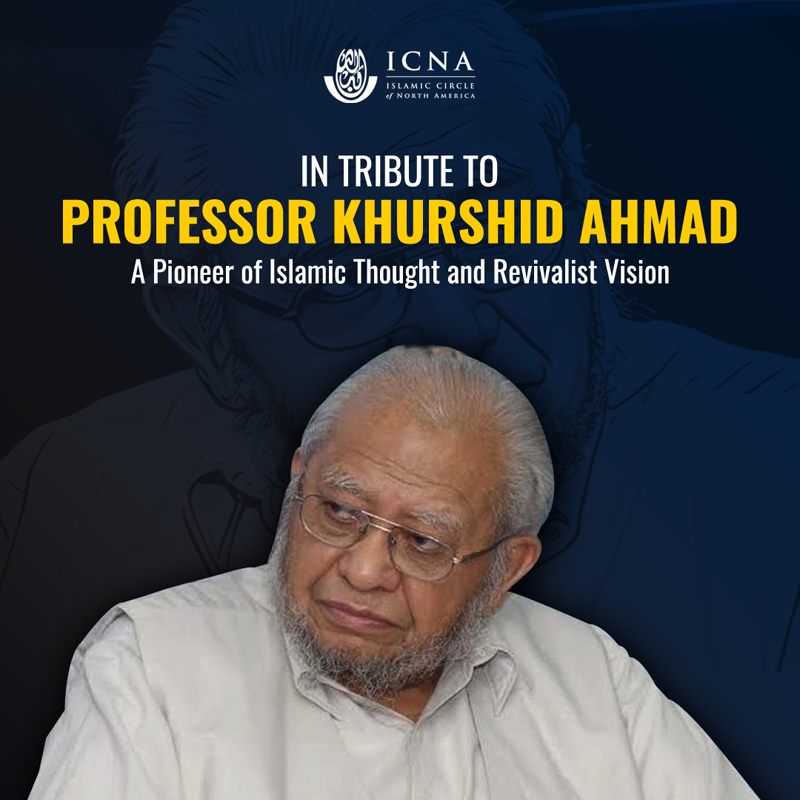
A Pioneer of Islamic Thought and Revivalist Vision “Among the believers are men who have been true to their covenant with Allah.” (Qur’an 33:23) It is with deep reverence that the Islamic Circle of North America (ICNA) mourns the passing of Professor Khurshid Ahmad (1932–2025), a distinguished scholar, visionary leader, and steadfast advocate for Islamic revival. His unwavering commitment to faith, intellect, and service has left an indelible mark on the global Muslim community. Born on March 23, 1932, in Delhi, Professor Ahmad migrated to Pakistan following the 1947 partition. He pursued his education with distinction, earning degrees in economics, law, and Islamic studies from Karachi University, and later completing a Ph.D. in Economics at the University of Leicester, focusing on Islamic economic jurisprudence. A pioneering figure in Islamic economics, Professor Ahmad co-founded the International Institute of Islamic Economics (IIIE) and played a pivotal role in establishing Islamic banking and finance as credible alternatives to conventional economic models. His scholarship emphasized the integration of Islamic principles into economic systems, advocating for justice, equity, and the eradication of exploitative practices. Beyond academia, Professor Ahmad was instrumental in shaping public policy in Pakistan. He served as the Federal Minister for Planning, Development & Statistics and as Deputy Chairman of the Planning Commission, where he worked to align national policies with Islamic values. His tenure in the Senate of Pakistan was marked by principled leadership and a commitment to the collective good of the Ummah. Professor Ahmad’s influence extended to the Western world, where he recognized the importance of building ideologically grounded Muslim communities. He co-founded The Islamic Foundation in Leicester, UK, fostering Islamic scholarship and education in Europe. His guidance and support were instrumental in the formation of ICNA, encouraging Muslims in North America to actively contribute to society while upholding Islamic values. A devoted disciple of Maulana Maududi, Professor Ahmad internalized and propagated the mission of Iqamat-ud-Deen—establishing Islam as a comprehensive way of life. He believed in Islam’s transformative power to address human suffering through its spiritual teachings and principles of justice and equality. Professor Ahmad’s life exemplified the ideals of servant leadership, humility, and unwavering dedication to the cause of Islam. His legacy serves as a roadmap for Muslims striving to fulfill their duties to Allah and society. We ask Allah (SWT) to shower His mercy upon Professor Khurshid Ahmad, forgive his shortcomings, accept his services, and grant him the highest place in Jannatul Firdaus. “Indeed, those who say, ‘Our Lord is Allah’ and then remain steadfast—on them the angels will descend, [saying], ‘Do not fear and do not grieve but receive good tidings of Paradise, which you were promised.’” (Qur’an 41:30) Islamic Circle of North America (ICNA) April 15, 2025
The Boosts and Benefits of Movement: The Role Exercise Plays in Ibadah

Ramadan recently came to a close, and I pray Allah (SWT) accepts all of our fasts, time spent in worship and fellowship, prayers, and pleas for repentance. I also pray He blesses us with life and vibrant health that we might welcome many more Ramadans in our lives and reap the blessings of this blessed month for years and years to come. Thinking ahead to future Ramadans, may Allah (SWT) bless me to see them, I’m reminded of what a friend shared with me about this most recent month of fasting. For the first time, she incorporated exercise into her routine. I was excited for her and encouraged her to keep going, but it got me thinking even more than I normally do about the importance of moving and exercising regularly, not only to keep ourselves healthy, but to honor the body Allah (SWT) entrusted to us, even when we are denying our bodies food and drink in a spiritual quest to become closer to Him. With Ramadan now in the rearview mirror, I hope many of you are jumping back into a regular fitness routine or looking to start one. Building stamina, flexibility, endurance, and strength are part and parcel of our faith as Islam certainly encourages care of our bodies. I’m sure many of us are familiar with Prophet Muhammad’s (peace be upon him) hadith concerning our health and the tremendous gift it is from our Lord. Narrated by Ibn Abbas, the Prophet (peace be upon him) said, “There are two blessings that many people are deceived into losing: health and free time.” (Bukhari 6412) You also may be aware of the Prophet’s (peace be upon him) advice to practice physical activities like horseback riding, swimming, and archery. Any of these and other exercise activities can ensure we are fit enough to stand long hours in taraweeh prayer in Ramadan, perform the strenuous rituals of the hajj, and complete our five daily salat prayers where we must stand upright, bend, prostrate and then lift our bodies back to standing, all of which takes muscular strength, endurance, and mobility. If you’re finding it difficult to commit to regular exercise, or if you tend to start strong but eventually find yourself unable or unwilling to maintain this healthy habit, perhaps a change in perspective might help you to find your way back to consistent movement. Like so many other things in our life, we Muslims can look to our beloved Islam for the answer. By doing so, we often find our worship is not only a boon to our spiritual health but to our physical health, as well. As mentioned, exercise helps us to fulfill many of the physical aspects of our worship. But did you know exercise also can improve brain function, notably our ability to concentrate? Think how this might elevate your salat or the time you spend reading Quran. How often do we find our minds wandering while we pray or when we are reading His word? Rather than being absentminded, we want to be focused on Allah (SWT) and the words we are reciting, hoping to deeply ponder and reflect on their meaning so that we might be more sincere in praising Him. Exercise might make this a bit easier, considering it improves blood circulation, thereby promoting increased blood flow and oxygen to our brains, resulting in better cognitive function and alertness. Additionally, when we work out our body releases neurotransmitters, namely serotonin and dopamine, which aid in putting us in a good mood, relieving stress, sharpening our focus, and helping us to be more motivated. If we could approach prayer and any other aspect of worship with a clear and alert mind, free of daily stressors and with a positive outlook, imagine how much more attention and concentration we could put on Allah! Remember, we have just come out of Ramadan, a month filled with discipline, commitment, and persistence of worship. Let us continue this momentum by honoring our bodies that Allah (SWT) blessed us with by taking good care of them, not only for the sake of how we feel, but for the sake of approaching our prayer and other acts of worship with a light and happy heart and a focused mind concentrated fully on Allah (SWT). Read Other Articles on messageinternational.org
Eid Mubarak 2025
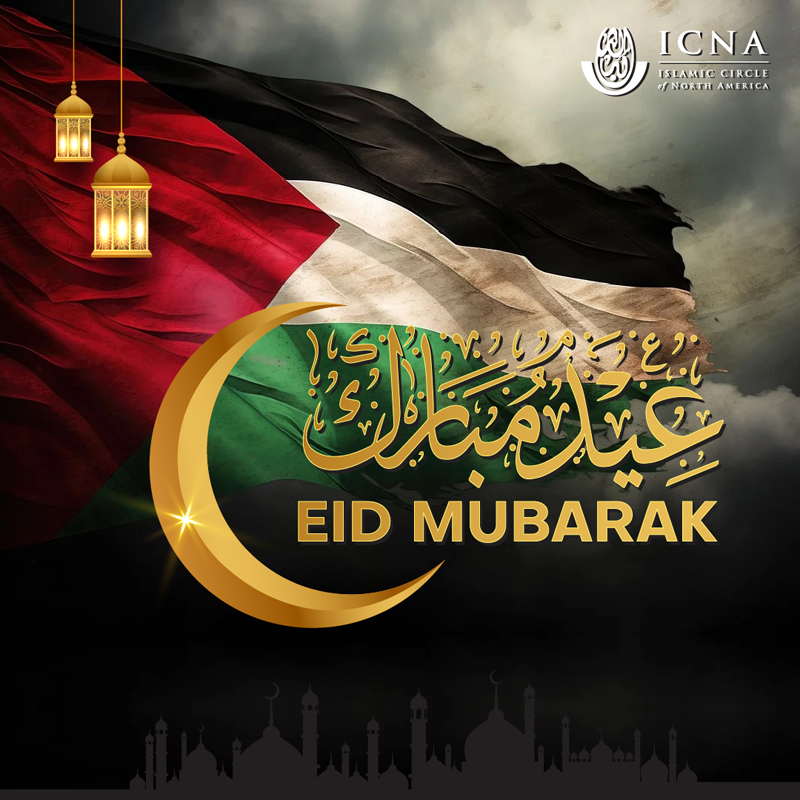
As-Salāmu ʿAlaykum wa Rahmatullāhi wa Barakātuh, On behalf of the Islamic Circle of North America (ICNA), I extend heartfelt Eid greetings to you and your loved ones. May this blessed day bring peace, joy, and renewed faith into your life. May Allah (SWT) accept our prayers, fasting, charity, and every act of devotion we offered in His path. This Eid arrives during challenging times, as our hearts remain with the people of Gaza and others facing hardship around the world. Even as we celebrate, we remember them in our duas and remain committed to justice and compassion.https://www.youtube.com/shorts/56hou4hcQKc Eid is not just a celebration—it’s an expression of deep gratitude to Allah (SWT) for drawing us closer to Him. That gratitude is best shown through action: by spreading the message of Islam with compassion, helping those in need, standing up for the marginalized, and responding to injustice with goodness. ICNA is committed to building a better future for our communities and our children, inspired by the beautiful teachings of Islam. But we cannot do this alone—we need you. Whether it’s through Da’wah, Relief, Young Muslims (YM), or Social Justice initiatives, there is a meaningful role for everyone, regardless of age or background. The time to act is now! Visit icna.org, learn about our mission, sign up as a Friend of ICNA, and support this vital work with your time, talent, and money. Donate. May Allah (SWT) bless you and your family with peace, guidance, and His infinite mercy. Eid Mubarak! Saad Kazmi President Islamic Circle of North America – ICNA
Seeking Knowledge: The Path to Paradise

As children, we’re taught the first word revealed in the Quran was “iqra” (read) in Surah Al-Alaq. If thoroughly reflected upon, we see this word comes in the surah that also detail’s man’s conception, al alaq, or the clot. This emphasizes the importance of seeking knowledge, how it begins at our conception and is a cornerstone of our faith. The ayah itself instructs Prophet Muhammad (peace be upon him) to “Read in the name of your Lord who created.” When we ponder what this means, we can understand our purpose, become closer to Allah, and navigate challenges and hardships with sabr (patience) and contentment as Muslims. Although it is a simple concept, when performed diligently, internalizing this truth has the potential to be immensely beneficial. In the Quran and sunnah, the pursuit of knowledge is repeatedly praised, demonstrating its significance. Allah says: “Say, ‘Are those who know equal to those who do not know?’” (Quran: 39:9) This illustrates those who have knowledge are not equal to those without. In fact, knowledge has several impacts for believers. 1. The path to Jannah becomes easier for us The Prophet (peace be upon him) said: “Whoever takes a path upon which to obtain knowledge, Allah makes the path to paradise easy for him.” (Sahih Muslim) What an incredible reward, subhanallah! Although learning is not always easy and dictates we must carve out the necessary time, this should motivate us to make the effort, even if only for five minutes or for five pages a day. You might question what types of knowledge are being referenced? In fact, Islam encourages the pursuit of both religious and worldly knowledge. Religious comprehension strengthens our connection with Allah, while worldly knowledge enables us to contribute positively to society and the ummah. Both types are beneficial. 2. A perpetual path to reward Additionally, the Prophet (peace be upon him) said: “When a man dies, his deeds come to an end except for three: sadaqah jariyah (continuous charity), knowledge which is beneficial, or a virtuous descendant who prays for him.” (Sahih Muslim) This hadith highlights beneficial knowledge’s lasting impact. In contrast to one-time charity, sadaqah jariyah blesses individuals for generations, guaranteeing the giver will continue to be rewarded even after death. The phrase “beneficial knowledge” refers to spreading wisdom through teaching, writing, or mentorship, ensuring the impact of one’s guidance extends beyond one’s lifetime. Seeking and espousing knowledge then acts as a phenomenal opportunity to invest in long-term goodness, leaving behind a meaningful legacy through acts of charity, knowledge, and nurturing faith in future generations. 3. Knowledge elevates people Seeking knowledge is a means for people to be elevated. The Quran says, “Allah will raise those who have believed among you and those who were given knowledge, by degrees. And Allah is well acquainted with what you do.” (Quran: 58:11) How incredible! According to Imam Al-Qurtubi, this verse was revealed when the Prophet’s (peace be upon him) companions were asked to make room in learning gatherings. This emphasized the importance of making space for those who wish to gain from the event as well. He also explains that “by degrees” describes the various elevations in this world and jannah. According to some Islamic scholars, knowledgeable people will be hundreds of degrees above common believers in paradise. Imam Al-Qurtubi also points to a hadith where the Prophet (peace be upon him) said, “On the day of judgment, the ink of the scholars will be weighed against the blood of the martyrs, and the ink of the scholars will be heavier.” 4. Learning leads to taqwa (piety) Allah says, “Indeed, those who fear Allah among His servants are those who have knowledge. Indeed, Allah is Exalted in Might and Forgiving.” (Quran: 35:28). This show true knowledge leads to piety and consciousness of Allah (swt), allowing us to be closer to Him. What more could we desire to help us attain our true goal of His pleasure and paradise? 5. Knowledge leads to spiritual and personal growth The more we know, the more we grow. Once we understand the Quran and sunnah, our best course of action is to apply it practically and improve ourselves. We should cleanse our hearts, repent for our sins, and make goals in order to become better Muslim versions of ourselves. If we find ourselves plateauing in life or even being content with who we are and what we do, that is a problem. We should never settle when it comes to our behaviors, actions, characteristics, and deeds. In fact, we should only be seeking improvement. We can begin this journey with three simple, practical tips. 1. Make pure intentions Ensure your intentions are sincere and pure and your aim is to learn for the sake of Allah alone. Often, people start with pure intentions but overtime they become tempted by shaytan and shift to gaining knowledge for credentials or fame. The Prophet (peace be upon him) said, “Actions are judged by intentions.” (Sahih Bukhari, Sahih Muslim). Thus, we must constantly renew our intentions and make sure our actions are for sake and pleasure of Allah only. 2. Start with the basics Begin your journey with baby steps, and focus on the fundamentals first. Try your best to set practical and realistic goals. If you enjoy reading, start with a familiar topic or a simple podcast before you delve into deeper issues of fiqh or other advanced subjects. Ensure your Islamic foundation is solid before advancing. From there, gradually expand to other areas like fiqh, seerah, and tafseer. 3. Use time wisely Try your best to designate specific times for learning. Even 15-30 minutes daily can lead to significant growth over time. Abu Huraira reported: The Messenger of Allah (peace be upon him) said, “Take up good deeds only as much as you are able, for the best deeds are those done regularly even if they are few.” So, even if it’s a 15-minute podcast in the car, or a Saturday class you attend, stay consistent and don’t give up. Don’t be discouraged that you’re
What’s So Special About Ramadan? Fasting, Forgiveness, and Forever
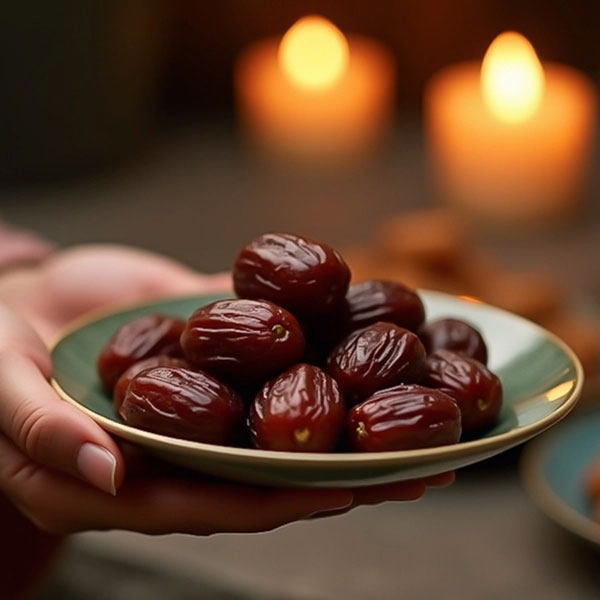
When the crescent moon appears, Muslims around the world pause. Homes buzz with excitement, mosques fill with light, and families gather with a shared mission. For 30 days, they fast from sunrise to sunset, pray late into the night, and give generously to those in need. To outsiders, these rituals may seem intense and difficult, but at its core, Ramadan is about something deeply human: the pursuit of meaning, connection, and investing in the hereafter. Ramadan isn’t just a religious obligation. For Muslims, Ramadan is a spiritual “reset button”, a chance to earn rewards that transcend this temporary world and invest in what they believe is an eternal hereafter. What is it that drives Muslims to do not only fast in daylight hours, but also stand in prayer at night, give charity, and recite the Quran from cover to cover? At the core of Islam is the belief in an afterlife, a day when every person’s deeds are weighed, and their eternal fate is decided. This belief creates urgency. Life is unpredictable, but Ramadan is a guaranteed annual “window” to earn mercy and blessings. Muslims prioritize good deeds during this month, believing they’ll matter more in the hereafter than material wealth. It’s a mindset that echoes universal questions we all grapple with: What will you leave behind when you’re gone? For Muslims, the answer lies in acts of kindness, self-improvement, and faith, a legacy written in moments of hunger, prayer, and generosity. Fasting: Hunger with a Higher Purpose At first glance, fasting from food and water for 30 days sounds grueling. But for Muslims, it’s a transformative practice rooted in self-discipline and empathy We live in a time where instant gratification is the norm, we are bombarded with advertisements to indulge, “just do it”, “obey your thirst”, “have it your way”. Fasting allows a person to break free from materialism and reconnect with their spiritual side which may have been neglected for the entire year. Fasting offers a chance for a fresh start. Muslims believe sincere fasting during Ramadan erases past mistakes, offering divine forgiveness and renewal. The Prophet Muhammad (peace be upon him) emphasized this clean slate, teaching that those who fast with sincerity faith and hope for a reward from God are forgiven their sins. Beyond personal growth, fasting cultivates empathy. Hunger pangs become daily reminders of those who live without enough food or clean water, inspiring many Muslims to donate meals or funds during the month. But fasting isn’t just about food. It’s a mental detox. Muslims also avoid gossip, anger, and negative habits, training their minds to focus on what truly matters. Think of it as a spiritual parallel to modern wellness trends like intermittent fasting or digital detoxes, both trade temporary discomfort for long-term growth. The Night of Power: A Single Night, Lifelong Rewards Hidden in Ramadan’s final days is Laylat al-Qadr (the Night of Power). The Quran calls it “better than a thousand months” (97:3), a phrase that humbles the mind: this single night holds more spiritual weight than 83 years of devotion. For Muslims, it is the holiest night of the year, a cosmic window where heaven draws near, angels descend, prayers are answered, and mercy flows like rain. On this night, God’s forgiveness envelops all who seek it. Sins, both great and small, are pardoned by a loving God for those who turn to Him with sincerity. But the Night of Power is more than forgiveness; it is a divine multiplier. A whispered prayer, a single act of kindness, reading a single verse from the Quran, or even a moment of quiet reflection carries rewards beyond human comprehension, as though one had performed that deed tirelessly for lifetimes. Imagine planting a seed and watching it grow into a forest overnight. That is the promise of this night. Muslims search for Laylat al-Qadr in Ramadan’s last ten days, often retreating to mosques or staying awake until dawn. They recite the Quran, weep in supplication, and give charity, not out of obligation, but with the awe of someone handed a key to eternity. For believers, this night is not just a ritual. It is a chance to rewrite their story, to compress decades of spiritual growth into hours, and to leave a mark on the universe that outshines the stars. Charity: Generosity as an Investment in the Future Ramadan’s spirit of giving goes beyond writing checks. Muslims practice zakat (obligatory charity) and sadaqah (voluntary giving), aiming to purify their wealth and uplift others. But Ramadan’s charity carries a promise far greater than worldly impact. The Prophet Muhammad, peace be upon him, taught that “charity extinguishes sin as water extinguishes fire” (Tirmidhi), framing generosity as a lifeline to divine mercy. Every dollar given, every hand extended, is weighed on celestial scales. Sharing meals at sunset is a beloved tradition. The Prophet Muhammad, peace be upon him, taught that feeding a fasting person earns the same reward as the one fasting, a gesture of solidarity that strengthens communities. But charity in Ramadan is also strategic. Funding a water well in a drought-prone village, for example, isn’t just aid, it’s seen as an act that will quench thirst forever in the hereafter. This belief transforms generosity into a legacy, where every coin given becomes a tree planted in paradise, offering shade long after the giver is gone. Prayer: Quiet Moments in a Noisy World Ramadan nights are marked by Taraweeh, special prayers where Muslims recite the Quran together. These aren’t robotic rituals; they’re moments of calm in a chaotic world. Like meditation or journaling, these prayers offer scheduled pauses for reflection. Mosques fill with people of all ages and backgrounds, standing shoulder-to-shoulder, a monthly reminder that everyone shares the same hopes and struggles. The Quran’s verses, recited in melodic tones, become a chorus of mercy, inviting worshippers to ascend in spiritual rank with every word. Conclusion Imagine hitting pause on the daily grind, stepping back from the nonstop chase for stuff, and asking yourself: What really matters? Even if you’re not Muslim, there’s something here. When’s the last time you gave your soul a little attention?
Welcome Ramadan
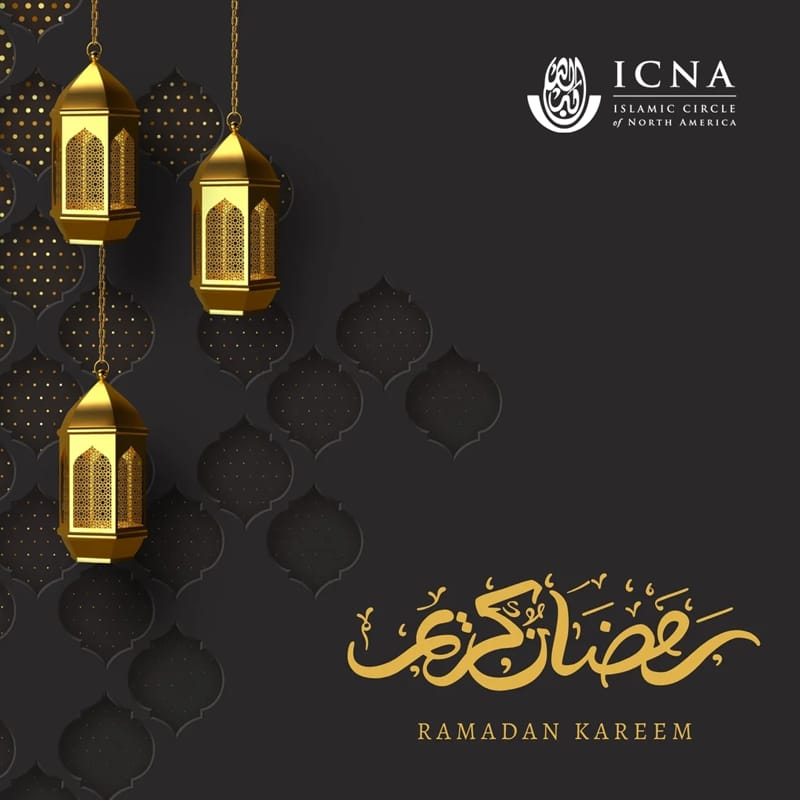
بِسْمِ اللَّهِ الرَّحْمَٰنِ الرَّحِيمِ السَّلَامُ عَلَيْكُمْ وَرَحْمَةُ اللَّهِ وَبَرَكَاتُهُ As the blessed month of Ramadan begins, the Islamic Circle of North America (ICNA) extends its warmest greetings to you and your loved ones. This sacred time invites us to strengthen our connection with our Creator, seek His mercy, and embrace the transformative power of prayer, fasting, and charity. More than abstaining from food and drink, fasting is a journey of self-discipline, patience, and spiritual purification. Ramadan is a time for deep reflection on our personal and collective responsibilities. It calls us to care for our families, support our neighbors, and uphold our duty to humanity and the Ummah. Above all, it reminds us to guide ourselves and others toward life’s ultimate purpose—preparing for the Hereafter. It was in this blessed month that the Quran was revealed as guidance for all of humanity. As such, it is incumbent upon the Muslim community to learn, practice, and promote its core teachings—sincerity, kindness, and justice—especially in standing with the oppressed. In particular, we must remember the people of Gaza, who are enduring one of the worst humanitarian crises in history. For over five decades, ICNA has been dedicated to serving communities across North America, fostering education, relief work, and Islamic outreach. Through initiatives like ICNA Relief, Helping Hand, WhyIslam, Embrace, and GainPeace, we strive to uphold the values of faith, service, and social justice. This Ramadan, we invite you to support ICNA’s efforts in spreading the message of Islam and assisting those in need. As we gather for Iftar, stand in prayer, and share our blessings through Zakat and Sadaqah, let us embrace the unity that Ramadan brings. May Allah (SWT) accept our fasts, prayers, and good deeds, grant ease to the oppressed, and guide us toward righteousness and Taqwa. وَالسَّلَامُ عَلَيْكُمْ وَرَحْمَةُ اللَّهِ وَبَرَكَاتُهُ Sadd KazmiPresident, Islamic Circle of North America (ICNA)
When Oppressors Fall, Lessons are Learned

Human history is rife with oppression, often cloaked by illusions of grandeur, military strength, and wealth. Yet the Qur’an reminds us of one unchanging reality: When the powerful resort to tyranny, they will inevitably face divine justice. It’s easy to believe might makes right, but the Qur’an demonstrates that no degree of power, wealth, or influence can avert God’s decree. Whether in the past or today, the same pattern emerges – tyrants rise, grow arrogant, oppress others, and are eventually undone. The Arrogance and Fall of Pharaoh Consider Pharaoh, who ruled Egypt with absolute power and committed crimes fueled by pride, declaring, “I am your lord, most high!” (Qur’an 79:24). His unchecked arrogance led him to subject the Children of Israel to forced labor, to deny them basic rights, and to have their newborn sons killed. Today we witness tyrants using lethal force against innocents, like Zionist forces in Palestine. Like Pharaoh, they disregard human life, believing political or military power shields them from moral accountability. Yet Pharaoh suffered Allan’s wrath when he and his army drowned in the Red Sea, obliterating his empire. No worldly luxuries nor amassed wealth shielded him. The lesson? When tyranny challenges divine authority, it’s condemned to failure. Wealth and the Pitfalls of Arrogance And what of Qarun, of Prophet Musa’s (peace be upon him) community? He had immense wealth and believed it a result of his intellect and skill, not divine blessings, making him arrogant. Yet his wealth, like Pharaoh’s armies, couldn’t save him. The earth swallowed him and his treasure. “So, We caused the earth to swallow him and his home.” (Qur’an 28:81) Qarun’s downfall challenges materialism. We often celebrate wealthy people and view them as paragons of success. But the Qur’an tells us that, while wealth can be a blessing, if it fosters arrogance and neglect of moral and spiritual responsibilities, it can become a curse. Qarun’s story teaches blessings must be used to serve God’s creation rather than to inflate personal egos. Historical Empires’ Collapse Historically, grand empires and powerful regimes that once seemed immutable have vanished. The Persian Empire, the Roman-Byzantine Empire, and other colonial powers have crumbled, leaving behind ruins and lessons. When the French colonized Algeria from1830–1962, indigenous Muslim populations suffered. Cultural suppression was rampant, and those who resisted were persecuted, imprisoned, and subjected to violence. The French believed themselves invincible, supported by a powerful military and a sense of cultural superiority. Yet the colonial edifice eventually collapsed, just like past empires. At its zenith, the British Empire included large swaths of South Asia, North Africa, and the Middle East. Many Muslims lived under restrictive policies that stunted their economic growth, suppressed Islamic institutions, and dismissed local voices. Though it presented itself as a beacon of civilization, the Empire disintegrated over the course of the twentieth century. Modern Examples of Tyranny’s End Syria’s Assad regime once appeared unassailable, surviving over fifty years of systematic oppression, torture, sexual violence, arbitrary arrests, and extrajudicial killings. Political power once considered monolithic is now fragmented and unstable. Many Syrians, those who endured torture, families who lost children, and the displaced who fled for safety, rejoiced at even partial signs of this regime’s weakening. Despite an uncertain future, we know oppressors who believe their power permanent eventually face their vulnerability. Leaders aren’t alone in their tyranny. Abusers who harm via physical, emotional, or psychological means, can oppress as well. When they face justice, their victims are relieved, yet believers recognize real accountability extends beyond this life. The Prophet (peace be upon him) taught, “No one who has an atom’s weight of pride in his heart will enter Paradise” (Muslim), underscoring how even a small measure of arrogance leads to spiritual ruin. Pride and Paradise Pride doesn’t just lead to external oppression; it poisons from within. It blinds individuals to their flaws, distances them from divine mercy, and deceives them into thinking themselves self-sufficient. The Prophet (peace be upon him) warns pride is destructive and must be rejected, teaching that humility is the path to divine success. The Question of Justice Delayed If oppressors’ downfalls are certain, why do many live long, successful lives with no punishment. Both Belgium’s Leopold II and Russia’s Joseph Stalin’s regimes led to the deaths of countless people yet they died in bed, seemingly without earthly retribution. Countless Zionist politicians seem to “escape” with barbaric crimes against humanity. This can test faith. The story of the People of the Ditch in Surah al-Burūj depicts believers thrown alive into a ditch of fire. The Qur’an doesn’t mention their oppressors’ immediate downfall, suggesting they escaped punishment. However, the message is this: Divine justice is never absent, only delayed. “And never think that Allah is unaware of what the wrongdoers do. He only delays them until a Day when eyes will stare [in horror].” (Qur’an 14:42) When oppressors die without accountability, we must remember our perception is limited. Complete justice belongs to God, whose knows all and who settles all moral debts on Judgement Day. This knowledge strengthens faith. Having Hope in Divine Justice Delayed or unseen justice encourages a profound relationship with Allah. The believer’s trust doesn’t just hinge on what happens in this world but rests in the conviction that God’s justice transcends human limitations. While this can be a severe test for oppressed communities, the Qur’an reassures us. “The way [of blame] is only against those who wrong the people and tyrannize upon the earth without right. Those will have a painful punishment.” (Qur’an 42:42) Moreover, martyrs’ fate reminds us that one’s spiritual standing trumps one’s worldly circumstances. The People of the Ditch perished in flames, but they are immortalized as paragons of faith and resistance. Conversely, their oppressors remain examples of moral bankruptcy who faced the ultimate reckoning. As a result, we recognize that patience and steadfastness have cosmic value. Responding to Oppression The Qur’an and hadith emphasize believers mustn’t despair when oppressed. Even when the wheels of justice grind slowly, or not at all, Muslims must


